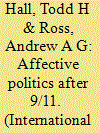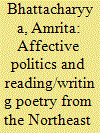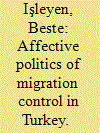| Srl | Item |
| 1 |
ID:
146143


|
|
|
|
|
| Summary/Abstract |
Affect and emotion are key elements of our lived experience as human beings but currently play little role in how we theorize actorhood in international relations. We offer six amendments for integrating affective dynamics into existing conceptions of individual-level actorhood in IR. From these amendments emerge the theoretical micro-foundations upon which we build propositions concerning potential collective-level affective dynamics and political strategies. We illustrate the analytical payoff of our proposals by examining the aftermath of the terrorist attacks on 11 September 2001. By amending existing understandings of actorhood to include human affective experience, we can integrate and make sense of a variety of psychological, social, and political consequences stemming from the attacks, both within the United States and internationally.
|
|
|
|
|
|
|
|
|
|
|
|
|
|
|
|
| 2 |
ID:
174794


|
|
|
|
|
| Summary/Abstract |
Theorization of cultural and political issues of Northeast of India often creates a disengagement from the actual cultural performances produced in the region. This unique geo-cultural place is sometimes homogenized. In actuality, it is the home of diverse socio-cultural practices and performances. In the context of globalization, deforestation, Christianization, other internal clashes and external influences, material bodies, here, are continuously being rewritten in socio-cultural sphere. Non-representational theory considers poetry as an effective mode of exhibiting the virtual multiplicity of the nonrepresentational world. This paper will focus on exploring the corpus of Northeast Indian English poetry that focuses on social practices and bodily experiences to interpret the entire cultural flow of everyday life. As Non-representational Theory positions ‘affect’ as a central issue to individual and collective disposition in constituting the affective political discourse, this paper will also indicate some political imperatives by advancing a politics of hope in the realm of socio-political sphere.
|
|
|
|
|
|
|
|
|
|
|
|
|
|
|
|
| 3 |
ID:
193143


|
|
|
|
|
| Summary/Abstract |
There is an increasing call for addressing the Eurocentrism of research on the external dimension of European Union (EU) migration and border policies and practices. A growing body of work attempts to remedy the discipline’s Eurocentrism through postcolonial theory. This article argues that more needs to be done to unsettle the Eurocentrism of migration studies with regard to the question of non-EU political subjectivity. The article adopts an alternative conception of subjectivity, which looks at the “affective” dimension of international relations. Through a close engagement with postcolonial studies on the question of political subjectivity, the article underscores the significance of history and historical relationships in constituting an affective politics of borders and migration in the non-EU world. The argument is illustrated through an empirical focus on Turkey. Drawing on interviews with Turkish border officials, the article aims to contribute to the literature in two ways. First, it argues that affective attachments shape how Turkish actors perceive and attribute meaning to national borders and human mobility across the national territory. Second, and relatedly, Turkish actors’ identification with and positioning towards the EU’s migration control regime are products of affective attachments rooted in historical experiences and encounters with Europe.
|
|
|
|
|
|
|
|
|
|
|
|
|
|
|
|